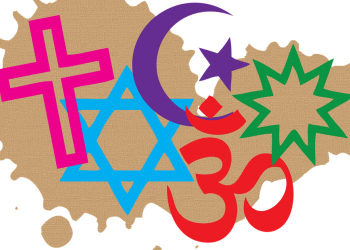A call to common cause: religious leadership in an age of transition
By Bani Dugal
I recently read that this month witnessed a rare confluence of religious celebrations—the Festival of Ridvan in the Baha’i Faith, Theravada New Year in Buddhism, Easter in Christianity, Hanuman Jayanti in Hinduism, Ramadan in Islam, Passover in Judaism, and Baisakhi in Sikhism.
While such alignment arises from the simple interaction of diverse calendar systems, its effect on lives and societies is not trivial. Millions around the world are simultaneously turning to the Divine in gratitude and supplication, even as they consider afresh some of the deepest questions of meaning, purpose, and one’s place and role in the world.
Notably, this month also marks the 20th anniversary of the release of a letter to the world’s religious leaders, sent by the Universal House of Justice, the world governing body of the Baha’i Faith. Written at a time when debate around questions of religious conflict and coexistence had become widespread and sometimes polarizing, the message invited religious leaders to reexamine issues lying at the heart of interfaith activity.
Such reexamination is as needed today as it was 20 years ago. Humanity is witnessing the limitations and sometimes the breakdown of numerous systems and structures that organize society today. From the climate crisis and inter-state conflict, to the rise in political extremism and the loss of trust in institutions of all kinds, arrangements that might have sufficed in the past are proving inadequate for the present stage of humanity’s collective development.
These breakdowns in the global order signal a broad failure of multilateralism, the ideology on which that order ultimately rests. Contemporary society asserts in countless ways that only the drive to gratify the most basic and self-interested wishes, wants, and desires can be considered reliable and realistic. Yet it becomes clearer by the day that tools which will be capable of solving global challenges will have to leverage to their fullest the motivating power of values and virtues, morals and ideals—rather than dismiss them out of hand.
Translating elevated principles into practical reality—for example, how entire populations can become distinguished by concern for the common good and commitment to the search for truth, rather than accumulation of personal wealth and the promotion of self over others—has long been a central concern of the world’s great religions. Communities that are actively laboring to put transcendent values into practice, for the betterment of all, therefore represent a reservoir of experience worthy of serious consideration.
Acknowledgement of the contributions of religious actors, and the prevalence of interfaith efforts at the United Nations and other international spaces, have grown over the past 20 years. Groups such as Religions for Peace, the Interfaith Alliance for Safer Communities, and the Multi-faith Advisory Council of United Nations Interagency Task Force on Religion and Sustainable Development, on which I currently serve, strive to find ways for diverse religions to draw closer together in working to address the ills plaguing the world today.
Yet it must be acknowledged that organized religion can also behave as an obstacle to progress. Prejudices of sex, ethnicity, and other characteristics, for examples, are sometimes given divine sanction in the name of religion. In some parts of the world, freedom of religion itself is denied at the behest of religious leaders. In this light, the words of the Universal House of Justice regarding the universal spiritual truth underlying all religions remain as relevant today as they were two decades ago:
We owe it to our partners in this common effort…to state clearly our conviction that interfaith discourse, if it is to contribute meaningfully to healing the ills that afflict a desperate humanity, must now address honestly and without further evasion the implications of the over-arching truth that called the movement into being: that God is one and that, beyond all diversity of cultural expression and human interpretation, religion is likewise one.
At its highest, religion has always concerned itself with the ennobling of character and the harmonizing of relationships. Its vital function of binding diverse peoples together in ever larger and more complex societies is needed now more than ever, as the coming decades look set to bring some of the most daunting challenges that the human family has ever had to face. Critical, therefore, are the contributions of religious leaders, joined in common cause to the service of humanity, that are theirs and theirs alone to make.
Bani Dugal is Principal Representative of the Bahá’í International Community United Nations Office
